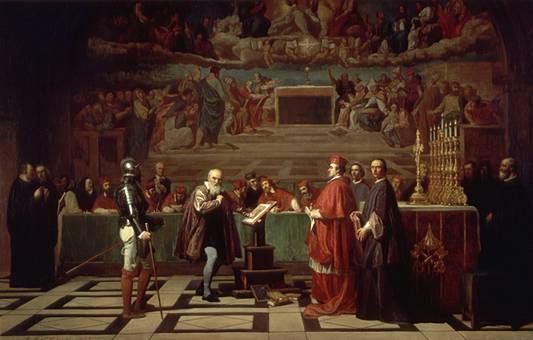
Galileo Before the Holy Office, by Joseph Nicolas Robert-Fleury (1797-1890) [public domain / Wikimedia Commons]
*****
Clinton Hooper is an agnostic. He showed up in a Facebook thread of mine that had a meme with 16 Catholic scientists. It sarcastically stated: “Catholics are Anti-Science. We’d Probably be in the Space Age by Now if it Weren’t for Those Catholics.” His words will be in blue. I won’t bother to correct all of his lack of capitals, etc.
How many of those catholics were catholics because to openly not be catholic during their time was basically a death sentence….
I should rephrase I suppose… how many of those catholics were quite literally ordered under threat of imprisonment and the possibility of torture to not disagree with the church…. easiest example: galileo…. may have been catholic, but he was also explicitly ordered not to hold a heliocentric view by the church and subsequently imprisoned by the church… how much worse would that punishment have been if he had been like “meh, i’m not a catholic anymore either!”
[I posted links to three of my related papers]
Galileo: The Myths and the Facts [5-11-06]
“No One’s Perfect”: Scientific Errors of Galileo and 16th-17th Century Cosmologies [7-29-10]
Dialogue on the Galileo Fiasco and the State of Scientific and Astronomical Knowledge in 1633 (vs. Eric G.) [5-13-06]
The Church clearly made mistakes in the Galileo affair, but none that affected infallibility. Galileo was sentenced to a luxurious palace with a supporter.
This is nothing like how the “enlightened” atheists in France treated great scientists. Lavoisier, the father of chemistry, was killed. For some reason, no one ever hears about that at all!
i’m glad you can google, but nothing you’ve posted disagrees with what I said…. in 1633 galileo was imprisoned for the rest of his life under “house arrest”… being comfortable does not make a prison any less of a prison.
Not to mention the “officially atheist” Chinese and Soviet treatment of scientists.
This isn’t about atheists… or protestants…. it’s about catholics. Also, galileo according to the first article you posted galileo was only in the palace for a few months. he spent the rest of his life under house arrest with “friends”.
I wasn’t Googling. These are all my own papers.
What is your worldview, Clinton? Yes, it’s about Catholics. We freely admit that we screwed up about Galileo. But things must be put into perspective, and a fair-minded approach taken. That’s what I attempt to do in my treatments of it. There is a huge double standard. It’s always Catholics and their error here [that are brought up].
Never mind that scientists at the time were, e.g., neck-deep into astrology. No one ever hears about that. Never mind that Galileo’s notion of scientific method was less modern than Bellarmine’s was. Never mind that Copernicus’ famous book was endorsed by the pope at the time.
It’s only Catholics who are supposedly “anti-science.”
My point in bringing up Lavoisier is obviously to argue: “if you are gonna get all righteously indignant about Galileo’s house arrest, as if this is the height of anti-scientific bigotry, then also get much more indignant about Lavoisier being murdered by the French radicals of the so-called ‘Enlightenment.'”
Don’t simply highlight one bad thing and ignore a far worse thing. That gives a wrong impression and is lousy history. But it happens all the time. The analyses are so often anti-Catholic in motivation.
Fair enough, the google comment was out of line.
My world view is irrelevant to the conversation, however I believe that there may or may not be a god. go back far enough and there’s still things that science cannot answer with current theories. who’s to say that far enough back there wasn’t a creator and he didn’t put all of this into motion…. go back far enough and even science relies upon blind faith in the form of assumptions.
I don’t take issue with catholics in particular, and I don’t really think Catholicism in its current state is anti-science… but that doesn’t mean that it was always the case. galileo is a prime example of this. was galileo wrong? absolutely, that’s the way science works… we’re constantly disproving someone else by presenting a better argument…
When the discussion is stifled by fear of persecution by the church, then the church (at the time) is anti-science. pretty much every major form of Christianity has been anti-science at one point or another.
I should say pretty much every major form of religion, including atheism, has been anti-science at one point or another.
Thanks for sharing your worldview, and I appreciate the qualifying statements.
Worldviews are always relevant to conversations, because everyone has a bias, and opposing positions have to be informed as to what someone’s position is in order to sensibly argue against them (because knowledge of premises of one’s debate opponent is key to all constructive dialogue).
You being an agnostic means that you will tend to view things in certain ways regarding all sorts of topics, just as I will tend to have many views because of being a Catholic.
I also put together an entire book about this issue.
Herein lies the problem. my worldview is not pertinent to the facts… you are arguing against me rather than discussing the facts. not to say this isn’t a perfectly valid strategy in order to “win” a debate, but it’s not the most effective way to get to the truth.
Worldviews are relevant for precisely the reason I gave: it creates some bias and others need to know about that. I am biased too. That’s all I’m saying.
I’m not arguing against “you” as an agnostic. That’s silly and a piece of sophistry. I have made all kinds of arguments in my papers and book on science; that the Galileo fiasco is not the height of “anti-science” in the history of the world. Far, far from that . . .
I used to think much like you when I was an evangelical. I thought that the Catholic Church was uniquely anti-science, till I studied the actual facts about the Galileo case.
It was temporarily, partially “anti-science” in a sense, and in a much more limited way than the standard secular / Protestant critical (and sometimes anti-Catholic) approach portrays it.
“how many of those catholics were catholics because to openly NOT be catholic during their time was basically a death sentence”
Yeah; how many priests and nuns had their heads chopped off in “Enlightened” France simply for being Catholics? You tell me. Again, if we’re gonna criticize one viewpoint, concerning a time when things were pretty universally intolerant, let’s be sure to do comparisons, so no one gets the impression that only Catholics persecuted folks, as if the secular / agnostic crowd did not do so.
As soon as these clowns got power in France, they started killing tens of thousands of people for disagreeing with them: priests, nuns, great scientists . . . And that was supposedly “enlightened” and a reaction against all those wicked intolerant Catholics.
Here are the numbers of murders in less than one year, in the Reign of Terror in France [1793-1794]: “The death toll ranged in the tens of thousands, with 16,594 executed by guillotine (2,639 in Paris), and another 25,000 in summary executions across France.” [Wikipedia article]
You keep trying to compare… saying “oh well these people were much worse!”… well getting punched in the gut is not as bad as being punched in the face, but it’s still being punched. in much the same way what happened elsewhere in the world was worse, but that doesn’t mean that the church wasn’t bad. the question at hand is not “was the world anti-<insert literally anything>” but specifically “is/was the catholic church anti-science”…
In that limited scope of topic, literally anything else is irrelevant. my beliefs, your beliefs, the “enlightened” and the reign of terror.. all irrelevant to the question of “is/was the catholic church anti-science”….. this scope limitation isn’t brought about by me, but by your original post.
Oh and by the way, never once did I say or even imply that what happened to galileo was unique to the catholics nor the “height of anti-science”… just that it was an excellent example of the church being anti-science for a time.
Well, you didn’t put it in such a sophisticated, nuanced fashion the first time. You stated: “how many of those catholics were quite literally ordered under threat of imprisonment and the possibility of torture to not disagree with the church.”
Yes, how many? Good question. Why don’t you tell us how many you think it was, and give us documented examples? You came up with Galileo as your “easiest example.” He wasn’t tortured. He was put under a relatively luxurious house arrest.
Since you imply that such things were widespread, why don’t you give us some more examples? If you can’t, then don’t go around implying that it was common, expected treatment for scientists to be threatened with imprisonment and torture in Catholic circles.
One anomalous example of poor treatment of a scientist doesn’t overcome the meme and establish that as a general rule, Catholicism was “anti-science.” It was not. We had a short period of time when the Church wrongly assumed that geocentrism was factually true: just a few decades after the great scientist Tycho Brahe held the same position, and when virtually all of the leading scientists (including Galileo) were enthralled with the pseudo-science of astrology.
There’s every reason to believe that Copernicus would have faced similar trial and imprisonment as galileo had he not died shortly after publishing his book on the same topic. according to my friend google (which I readily acknowledge does not tell the whole truth and nothing but the truth) here are a couple of examples other than galileo….
Bacon was imprisoned, and the church restricted him (as friar) from publishing works without their specific approval…
Descartes fled from france and take refuge in Sweden, to have his works banned by the catholic church after he passed…
Now, how many of the folks who had their works banned or condemned overall were catholic I don’t know… but the number of scientists and philosophers condemned by the church, or who had works banned/condemned by the church seems to be quite large for an organization that has never been anti-science.
It seems to me that the church went through a good long stretch where some science was embraced, so long as it didn’t contradict with anything they had previously taught…. but where works exhibited support for ideas that didn’t necessarily agree with the church got their authors in some serious trouble.
[Roger] Bacon is not a very good example of your dubious thesis. According to Wikipedia:
The Condemnations of 1277 banned the teaching of certain philosophical doctrines, including deterministic astrology. Some time within the next two years, Bacon was apparently imprisoned or placed under house arrest. This was traditionally ascribed to Franciscan Minister-General Jerome of Ascoli, probably acting on behalf of the many clergy, monks, and educators attacked by Bacon’s 1271 Compendium Studii Philosophiae. Modern scholarship, however, notes that the first reference to Bacon’s “imprisonment” dates from eighty years after his death on the charge of unspecified “suspected novelties” and finds it less than credible. Contemporary scholars who do accept Bacon’s imprisonment typically associate it with Bacon’s “attraction to contemporary prophesies”, his sympathies for “the radical ‘poverty’ wing of the Franciscans”, interest in certain astrological doctrines, or generally combative personality rather than from “any scientific novelties which he may have proposed.
Thus, scholars either question that it took place at all, or hold that if it did, it had nothing to do with science.












